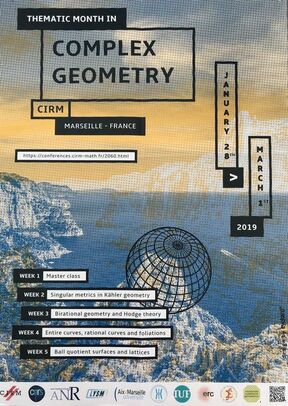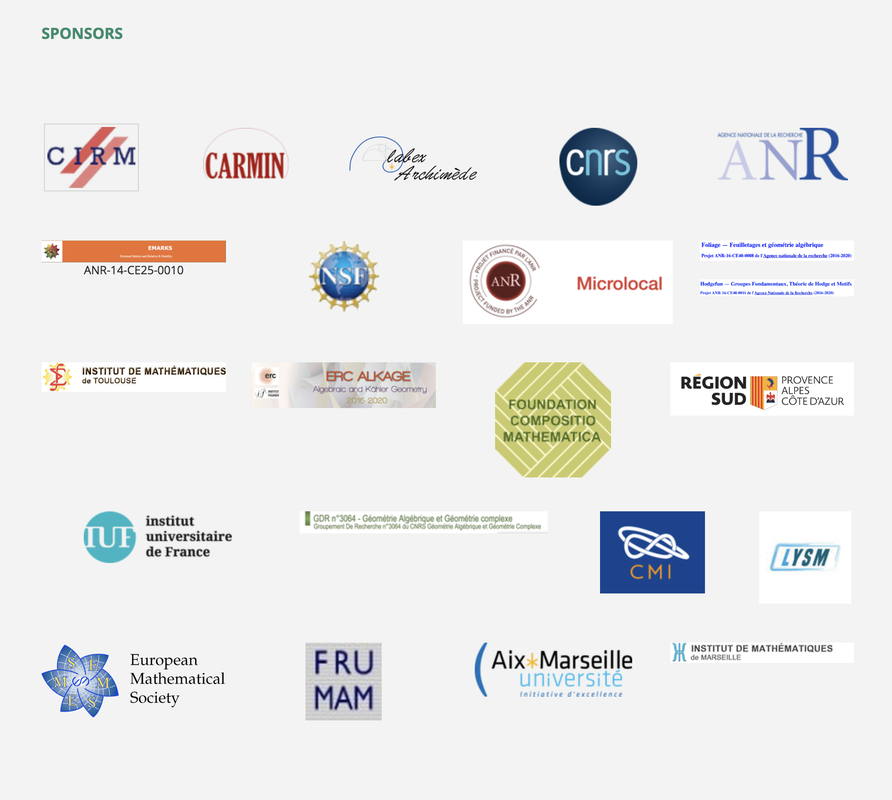|
CONFERENCE
Birational Geometry and Hodge Theory Scientific Committee
Comité scientifique Igor Dolgachev (University of Michigan) Organizing Committee
Comité d’organisation Benoît Claudon (IRMAR Rennes) |
|
Recent advances in Hodge theory, the theory of singular hermitian metrics and moduli theory of higher dimensional varieties have led to major breakthroughs in solving long-standing problmes in complex algebraic geometry, in particular birational geometry.
In Hodge theory, Saito’s theory of Hodge modules have proved to be a specially relevant framework for the study of hyperbolicity properties of the base spaces of families of smooth varieties, admitting a (relative) good minimal model. In particular, it has been shown that such base spaces are always of log-general type, whenever the family has maximal variation, proving a deep conjecture of Viehweg (Viehweg, Zuo, Kebekus, Kovács, Campana, Paun, Popa, Schnell and others). Furthermore, these generalized Hodge theoretic notions have resulted in new (and more general) proofs of vanishing results in birational geometry (Popa, Kovács, Mustata, Wu, Arapura and others). In a different but closely related direction, a new, deeper understanding of singular metrics on higher rank, singular sheaves with “good » curvature properties has emerged (Berndtsson, Paun, Takayama, Cao and others). Major applications to Iitaka’s conjecture for Kodaira dimension of algebraic fibre spaces have (subsequently) followed (Pǎun, Cao, Hacon, Popa, Schnell and others). In moduli theory, the construction of moduli spaces of higher dimensional varieties is a fundamental problem. Here, as the result of Kollár and Kovács show, construction of “reasonable » moduli functors require close analysis of Hodge theoretic aspects of singularities of stable varieties. The aim of this week is to further investigate these emerging methods with a – Hodge theory. This includes an introduction to the theory of Hodge modules. Investigation of new applications of this theory in the study of Viehweg’s hyperbolicity conjecture and its various generalizations. – Moduli of higher dimensional varieties. This consists of studying the – Interactions between Analytic and Hodge theories. The main aim Junior women mathematicians and those from underrepresented minority groups will be given priority for financial help. |
Les avancées récentes en Théorie de Hodge, dans la théorie des métriques hermitiennes singulières et des espaces de modules en dimension supérieure ont mené à des avancées majeures avec la résolution de conjectures anciennes en géométrie algébrique complexe, en particulier en géométrie birationnelle. En théorie de Hodge, la théorie de Saito des modules de Hodge s’est avérée être un cadre particulièrement adapté à l’étude des propriétés d’hyperbolicité des espaces paramétrant des familles de variétés lisses, admettant un bon modèle minimal (relatif). En particulier, il a été montré que de tels espaces sont toujours de type log-général quand la famille a variation maximale, démontrant ainsi une conjecture profonde de Viehweg (Viehweg, Zuo, Kebekus, Kovács, Campana, Paun, Popa, Schnell…).
De plus, ces notions de théorie de Hodge généralisée ont permis d’établir des preuves nouvelles (et plus générales) de théorèmes d’annulation en géométrie birationnelle (Popa, Kovács, Mustata, Wu, Arapura…). Dans une direction différente mais proche, une compréhension nouvelle et plus profonde des métriques singulières sur les faisceaux singuliers de rang supérieur, avec de “bonnes” propriétés de courbure est apparue (Berndtsson, Paun, Takayama, Cao…). Des applications importantes à la conjecture d’Iitaka sur la dimension de Kodaira des espaces algébriques fibrés ont suivi (Pǎun, Cao, Hacon, Popa, Schnell…). En théorie des espaces de modules, la construction d’espaces de modules en Le but de cette semaine est l’étude de ces nouvelles méthodes en vue de leurs applications à la géométrie birationnelle et aux espaces de modules. Voici les principaux sujets qui seront couverts. – Théorie de Hodge. Introduction à la théorie des modules de Hodge. Etude des nouvelles applications de cette théorie aux conjectures d’hyperbolicité de Viehweg. – Espaces de modules en dimension supérieure. Etude de la théorie de Hodge des dégénérescences des singularités des variétés stables et leur rôle – Interactions entre la théorie analytique et la théorie de Hodge. Le but principal ici est l’étude de la complémentarité de ces deux approches, particulièrement dans le contexte des espaces de modules et de la conjecture d’Iitaka. Les jeunes mathématiciennes et les personnes provenant de minorités seront considérés comme prioritaires pour l’obtention d’une aide financière. |
Sándor Kovács (University of Washington) Compact moduli spaces of higher dimensional varieties and singularities
Lei Wu (University of Utah) Introduction to Hodge modules
Talks
Benjamin Bakker (University of Georgia) o-minimal GAGA
Olivier Benoist (CNRS / ENS Paris) On the Lüroth problem for real varieties – VIDEO –
Yohan Brunebarbe (University of Zurich) Algebraicity of period maps via o-minimal GAGA
Nero Budur (KU Leuven) Absolute sets and the Decomposition Theorem – VIDEO –
Junyan Cao (Sorbonne Université) A decomposition theorem for projective manifolds with nef anticanonical bundle
Hélène Esnault (Freie Universität Berlin) Arithmetic of rank one local systems – VIDEO –
Enrica Floris (Université de Poitiers) On the b-Semiampleness conjecture – VIDEO –
Stefan Schreieder (LMU Munich) Stably irrational hypersurfaces of small slopes – VIDEO –
Kang Zuo (JGU Mainz University) Rank-2 motivic local systems over punctured projective line via an arithmetic Simpson correspondence



